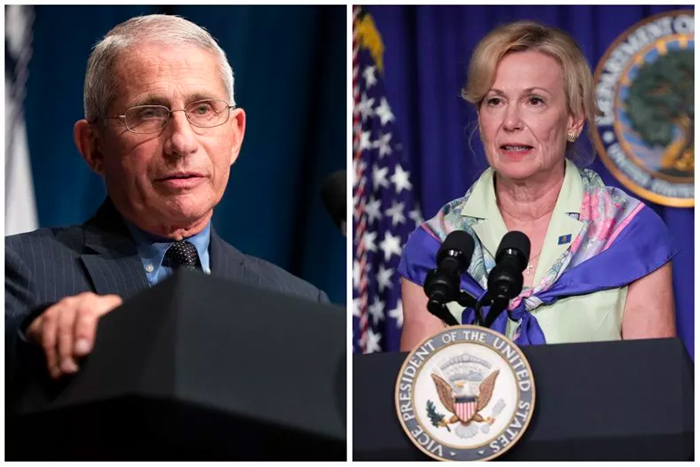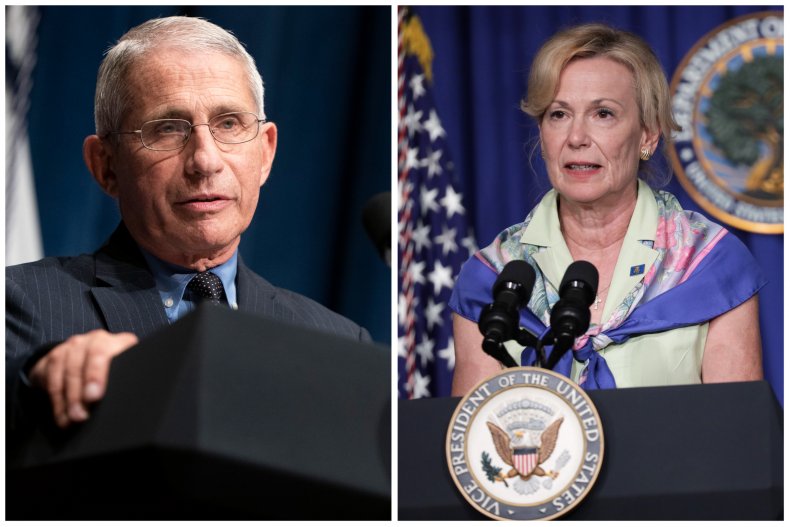
David Frum: Voting Against Trump
Notorious RINO and Atlantic writer David Frum joins Jamie Weinstein to explain why he’s voting for Kamala Harris this election. Frum, a former speechwriter for President…
Thought Leader: David Frum

Dr. Anthony Fauci and Dr. Deborah Birx have made suggestions about how the Centers for Disease Control and Prevention (CDC) must be reformed.
Fauci, director of the National Institute of Allergy and Infectious Diseases and President Joe Biden’s chief medical advisor, and Birx, former president Donald Trump’s coronavirus response coordinator, spoke after the CDC director, Rochelle Walensky, announced plans to change how the agency functions.
“In our big moment, our performance did not reliably meet expectations,” Walensky said, following the publication of an internal report criticizing the agency’s response to the COVID-19 pandemic.
Fauci, who announced this week that he will be stepping down from both his roles in December, made three suggestions as to how the CDC should be run, during an interview on MSNBC’s The Rachel Maddow Show Monday.

Speaking to Maddow, Fauci said the CDC did learn lessons from previous outbreaks such as HIV and Ebola, but their response to the coronavirus outbreak had “eroded” in some areas because of a “sense of neglecting of the capabilities” of the local public health officials.
“If you want to respond to an emerging infection, you do need leadership from above. You need central support from the government at the local level,” Fauci said.
Fauci said one lesson to be learned from the response to COVID is to be more “flexible” when outlining how to deal with an emerging pandemic.
“We’ve got to be able to respond, but we’ve also got to be flexible,” Fauci said. “Some of our military colleagues have told us it’s kind of like when you’re at a war. You can plan what you’re going to do, but when the bullets go off and the cannons start firing, then it becomes the ‘fog of war’ and you’ve got to be flexible enough to respond.
“I hope that lesson has been learned and, as we look forward to the inevitability of future outbreaks, we will not forget that lesson.”
Fauci also said that the CDC needs to understand better about how humans interact with animals. Around 70 to 75 percent of emerging infectious diseases are zoonotic, which means they are transmitted between species from animals to humans, or vice versa.
“If we really want to pay attention to how we can mitigate this, we have to pay much more attention to the animal/human interface, and to what we are doing intentionally or inadvertently curbing human/animal interface by encroaching upon rainforests, getting involved in interfacing with animals, such as in the wet markets which occur in China,” Fauci said.
Birx also made a number of suggestions as to how the CDC should be reformed during an interview with CBS’ Face the Nation on Sunday.
One of Birx’s main criticisms was about the systems used by the CDC for data collecting and sharing, which became an issue when the pandemic was breaking out in the U.S.
“In March of 2020, all of our data that I used to warn Americans of who was at risk for severe disease, hospitalization and death came from our European colleagues,” Birx said. “That, in itself, should be an indictment of our system.”
Birx told Face the Nation that “sometimes we hold ourselves back.” The CDC did not ask for assistance from the private sector, something that needs to change. “The private sector is willing to help us.
“In many countries, the public health system and the clinical system are one. In our country, they have been separate, and it has failed us. And there is a way to really get real-time data from our clinical care system, from our hospitals, from our clinics, and from our laboratories,” Birx said.
“Rather than creating a parallel system, it all starts with the data, and they need to create a public-private partnership between our clinical care systems and laboratories, and ASPR (Administration for Strategic Preparedness and Response) and NIH (National Institutes of Health), so that the data is available in real-time.”
Birx also agreed with Walensky’s suggestion that the CDC needs improve how it presents report findings and explanations when issuing guidance to the public.
“I’ve asked them over and over again. If you’re going to issue guidance, like five days in return to work in a mask, show the data transparently that you utilized to come to that decision,” Birx said. “Americans are smart; they can process the information. Give them all of the data.”
Birx was asked how the CDC can regain the public’s trust after it admitted a number of failings around the pandemic.
In response, Birx pointed to findings outlined in the CDC report, suggesting there needs to be “better data, better accountability, better transparency” in order to rebuild trust.
“People can understand complicated issues,” Birx said. “Your job is to take complex situations and data, and create graphs so that people can understand why you are making those recommendations.”
Birx also said that the CDC must learn lessons from their mistakes more quickly, something that it has failed to do amid the outbreak of monkeypox across the country.
“What was so disturbing to me about monkeypox is a lot of the issues that got us into the ditch with COVID were repeated,” Birx said. “Not adequate testing early on; not making tests available in every community that you knew was at risk.
“We had the roadmap of who was at risk. We should have immediately made tests available through the gay and bisexual network. They are very responsible people. They’re very knowledgeable about prophylactics and preventing disease, because they’ve been doing it for decades.”
Birx added that if the monkeypox vaccine or testing had been made more readily available to the gay and bisexual community in May, then the outbreak would not be as severe as it is now in August.
“Just like what happened with COVID, lack of preparation, lack of engagement, lack of utilization of the tools that we had in real-time,” Birx said.
David Frum: Voting Against Trump
Notorious RINO and Atlantic writer David Frum joins Jamie Weinstein to explain why he’s voting for Kamala Harris this election. Frum, a former speechwriter for President…
Thought Leader: David Frum
This is the latest episode of Climbing Gold with Alex Honnold. Tucked away in a corner of Chilean Patagonia, Valle Cochamó wasn’t going to stay hidden…
Thought Leader: Alex Honnold
Sanjay Gupta: Self-Exams Matter
This is the latest episode of Chasing Life with Dr. Sanjay Gupta. Sara Sidner is a hard-hitting CNN journalist. Ananda Lewis is a content creator and former…
Thought Leader: Sanjay Gupta

